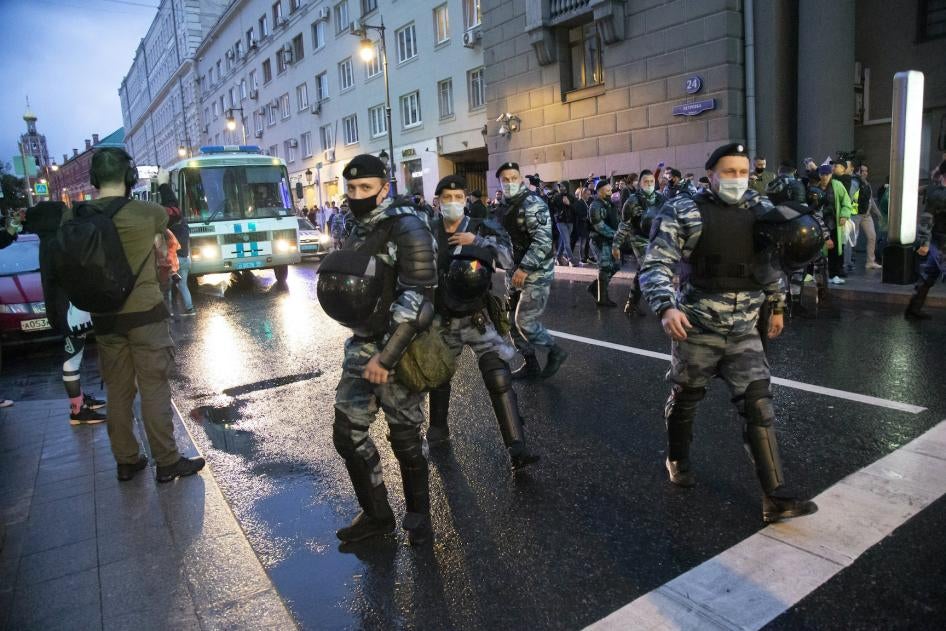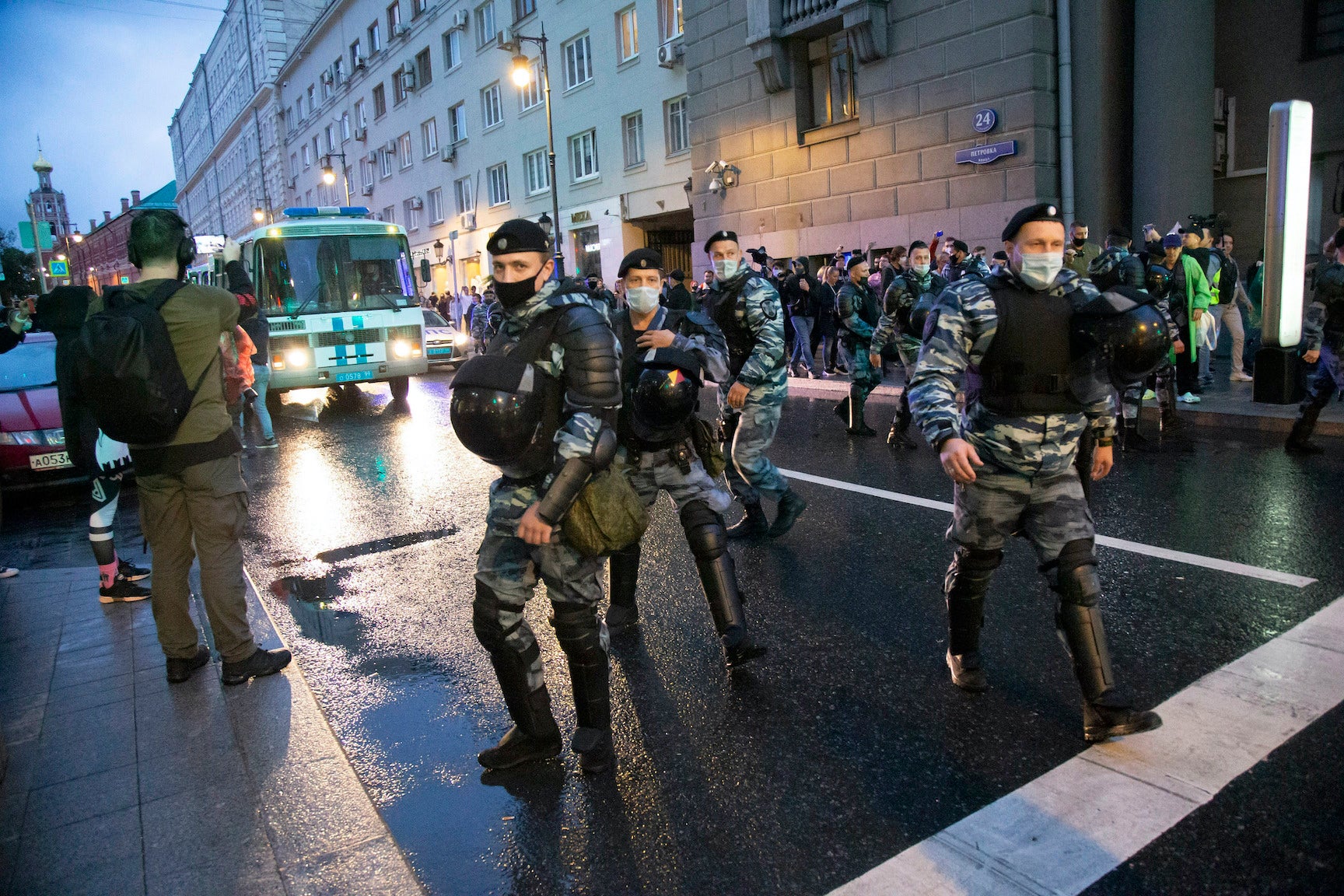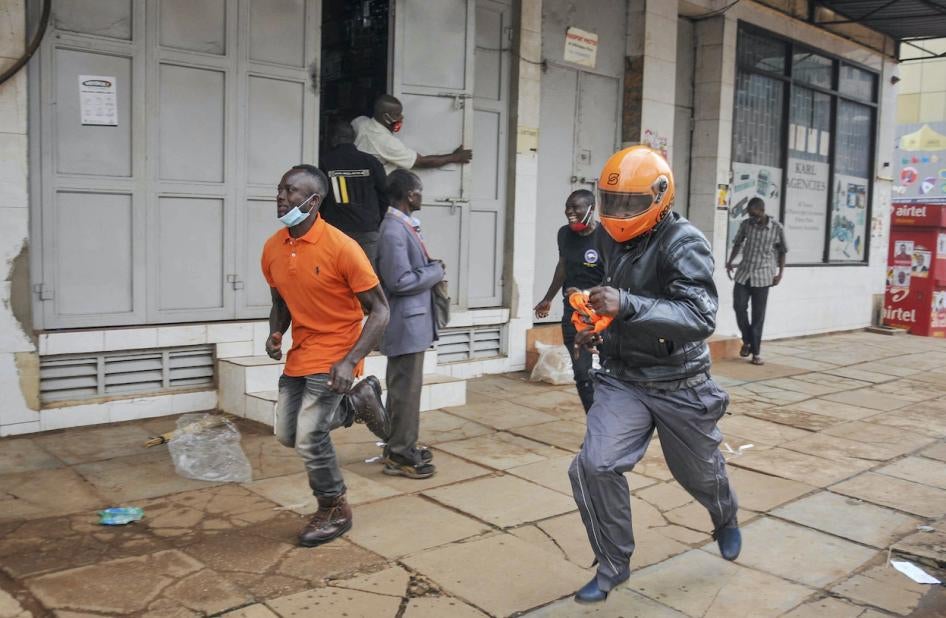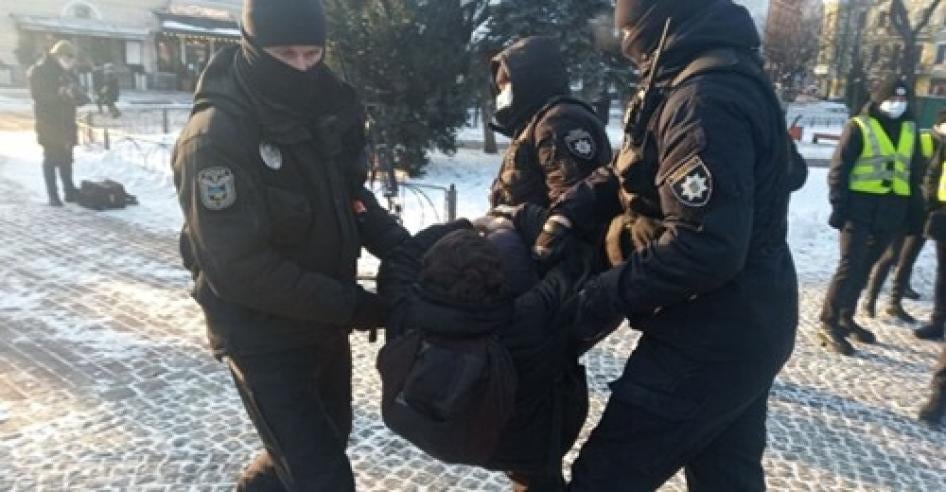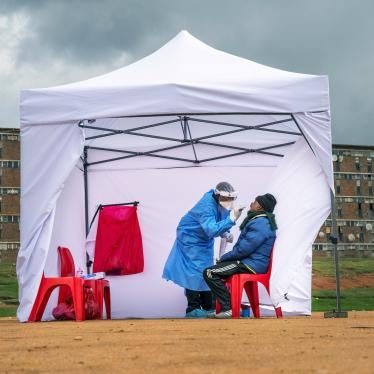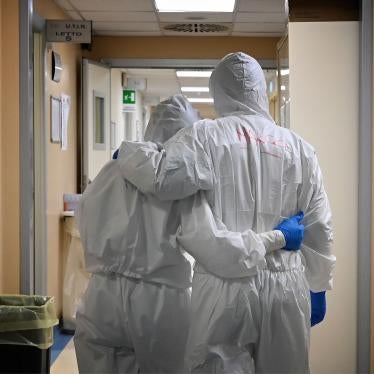At least 83 governments worldwide have used the Covid-19 pandemic to justify violating the exercise of free speech and peaceful assembly, Human Rights Watch said today. Authorities have attacked, detained, prosecuted, and in some cases killed critics, broken up peaceful protests, closed media outlets, and enacted vague laws criminalizing speech that they claim threatens public health. The victims include journalists, activists, healthcare workers, political opposition groups, and others who have criticized government responses to the coronavirus.
“Governments should counter Covid-19 by encouraging people to mask up, not shut up,” said Gerry Simpson, associate crisis and conflict director at Human Rights Watch. “Beating, detaining, prosecuting, and censoring peaceful critics violates many fundamental rights, including free speech, while doing nothing to stop the pandemic.”
Governments and other state authorities should immediately end excessive restrictions on free speech in the name of preventing the spread of Covid-19 and hold to account those responsible for serious human rights violations and abuses, Human Rights Watch said. The United Nations Human Rights Council in its session beginning February 22, 2021, should commission a new report from the UN High Commissioner for Human Rights focusing on states’ compliance with their human rights obligations in responding to Covid-19, including the impact of restrictions on free speech and peaceful assembly.
Human Rights Watch reviewed national government responses around the world to the Covid-19 pandemic and found that unlawful interference with free speech has been one of the most common forms of overreach. In some countries, violations were limited. In others, such as China, Cuba, Egypt, India, Russia, Turkey, Venezuela, and Vietnam, government violations affected hundreds or thousands of people.
In some countries, including Bangladesh, China, and Egypt, people remain in detention at the time of writing simply for criticizing government responses to Covid-19 months earlier.
They include Zhang Zhan, a 37-year-old citizen journalist, who in December was sentenced to four years in prison by a Shanghai court for “picking quarrels and provoking trouble” by traveling in February 2020 to Wuhan and reporting from there on the coronavirus outbreak. Officials have been force-feeding Zhang since she started a hunger strike soon after her detention in May and her health is deteriorating, her lawyer said.
“I spend every day in fear,” Zhang said before her conviction. “I am afraid when an Army officer threatens me. Or when the police tell me they’d beat me to death. Or when a friend warns me that the National Security Department is onto me. … I’m just documenting the truth. Why can’t I show the truth?”
Human Rights Watch identified the following trends:
- Military or police forces in at least 18 countries physically assaulted journalists, bloggers, and protesters, including some who criticized government responses to Covid-19 such as insufficient healthcare funding, lockdowns, and a lack of masks and gloves for medical workers. Abuses include firing live ammunition at peaceful protesters, beating them at checkpoints, and assaulting them in detention, with apparent impunity. In most cases, these forces said they were enforcing Covid-19-related regulations. In Uganda, security forces also killed dozens of protesters.
- Authorities in at least 10 countries have arbitrarily banned or broken up protests against government responses to Covid-19, in some cases citing social distancing concerns, or have used Covid-19 as a justification to disperse protests and other gatherings critical of government policies unrelated to the coronavirus. In all cases, the authorities intervened despite permitting other large gatherings.
- Since January 2020, governments in at least 24 countries have enacted vague laws and measures that criminalize spreading alleged misinformation or other coverage of Covid-19, or of other public health crises, which the authorities claim threaten the public’s well-being. Governments can easily use imprecise laws as tools of repression. At least five countries have also criminalized the publication of alleged misinformation on a range of other topics, including public health.
- Authorities in at least 51 countries have used laws and regulations adopted to prevent the spread of Covid-19, as well as counterterrorism and other measures pre-dating the pandemic, to arbitrarily arrest, detain, and prosecute critics of government responses to the coronavirus, or of policies unrelated to the pandemic, resulting in fines and imprisonment. Those targeted include journalists, bloggers and others posting online, opposition figures and activists, protesters, academics, healthcare workers, students, lawyers, cartoonists, and artists.
- Using the new laws, laws pre-dating the pandemic, or without citing any laws, at least 33 governments have threatened critics, in some cases with prosecution, if they criticize the authorities’ response to the pandemic. Eight of these countries investigated, threatened, and dismissed medical staff for speaking publicly about the authorities’ response to the pandemic. At least eight countries have also suspended or restricted the right to request and receive information from the authorities, including on public health matters. At least 12 countries have blocked specific Covid-19-related media reports or shut down media outlets for their reporting on the pandemic.
Governments are obligated to protect the right to freedom of expression, including the right to seek, receive, and impart information of all kinds online and offline, including on public health. The right to freedom of expression is integral to the enjoyment of freedom of assembly, including for public protest. Human rights treaties, including the International Covenant on Civil and Political Rights (ICCPR), permit restrictions on freedom of speech and assembly only if they are provided for by law, are strictly necessary and proportionate to achieve a legitimate aim, including the protection of national security, public order or public health, and morals, and are nondiscriminatory. Other legitimate aims include the protection of the rights or reputation of others in the case of free speech, or, in the case of freedom of assembly, the protection of the “rights and freedom” of others.
When governments face a public emergency that “threatens the life of the nation” or “the independence or security” of a country, and they cannot achieve their public health or other public policy objectives by imposing only these restrictions, key international human rights treaties allow them temporarily to further restrict or even suspend some rights, including freedom of speech. They may do this by entering a derogation from their obligations. In such cases, governments should declare a state of emergency, show why more “severe” restrictions are necessary, and provide for such restrictions in law with sunset clauses that will ensure the temporary nature of the exceptional restrictions. As with any limitation on rights, restrictions imposed under a derogation must be nondiscriminatory. They should register these acts of derogation from their human rights obligations with the UN and, for states parties to either European or American regional instruments, with the Council of Europe or the Organization of American States, whose relevant bodies may assess the legitimacy of the derogations and monitor the restrictions
Only 44 of the 83 countries that Human Rights Watch found to have breached freedom of expression or assembly rights have declared a state of emergency. However, none registered derogations relating to freedom of speech and only eight registered derogations relating to freedom of assembly. Failing to register derogations makes it easier for governments to evade international oversight that could curb the abuse of extraordinary powers. Countries that are parties to the ICCPR and that declare states of emergencies without registering derogations nonetheless remain bound by international law governing them.
Governments also have an international obligation to provide the public with access to accurate information on health threats, including methods of preventing and controlling them. Disproportionate curbs on free speech can make it harder to counter misinformation about Covid-19, including conspiracy theories about false and dangerous treatments that have flourished on social media and offline.
“Excessive and sometimes violent crackdowns on critical speech by governments signify a perilous willingness to sideline a fundamental freedom in the name of countering Covid-19,” Simpson said. “The obligation of governments to protect the public from this deadly pandemic is not a carte blanche for placing a chokehold on information and suppressing dissent.”
Methodology
On January 30, 2020, the World Health Organization (WHO) declared Covid-19 a “public health emergency of international concern” and on March 11 it declared the coronavirus a pandemic. Since then, Human Rights Watch has identified violations of the rights to freedom of expression and assembly in 83 countries, based on its own research, as well as outside sources including the Covid-19 Civic Freedom Tracker of the International Center for Not-For-Profit Law (ICNL) and European Center for Not-For-Profit Law (ECNL), reports by other nongovernmental organizations and the United Nations, and international and local media.
Human Rights Watch collaborated closely with ICNL, ECNL, and the UN special rapporteur on the promotion and protection of human rights and fundamental freedoms while countering terrorism in preparing this report, and shared all cases identified during the research with the ICNL for its tracker. The true extent of the abuses may be greater. Production of this report was supported in part by a grant from the Open Society Foundation.
Violence Against Journalists, Peaceful Protesters, Opposition Activists, Lawyers
Security forces or state officials in at least 18 countries have physically assaulted journalists and bloggers reporting on Covid-19-related policies, as well as protesters, opposition activists, and lawyers, including some who criticized government responses to Covid-19. In most cases, the security
forces justified their excessive use of force by saying they were enforcing Covid-19 regulations.
In at least one country, Uganda, security forces killed protesters. In November, the security forces arrested Robert Kyagulanyi, a presidential candidate, for allegedly breaching Covid-19 regulations by mobilizing large crowds for his campaign rallies. They then used teargas and live bullets against supporters protesting his detention, killing at least 54 and injuring 45. During the same period, the authorities allowed large pro-government rallies. Security Minister Elly Tumwine warned against further protests and told the public that the police have the right “to shoot you and kill you.” On November 29, President Yoweri Museveni promised to investigate the killings and to compensate some of the victims.
In India, police officers in March beat 10 journalists with sticks as they tried to report that a checkpoint which police in Andhra Pradesh state had set up to limit the spread of Covid-19 had cut off villagers from their homes. Seven journalists required treatment at a local hospital.
“We tried reasoning with the police to … move the check post further because it was affecting residents of at least seven villages,” one of the journalists, Chalamashetty Srinivas, told local media. “The deputy superintendent of police … got down from the car and charged at us with a lathi [bamboo police baton].”
Security forces in Cuba between April and November used regulations designed to prevent the spread of Covid-19 to harass and imprison critics, arbitrarily detaining and assaulting several opposition activists for allegedly breaching Covid-19 public health restrictions, including wearing a face mask improperly.
In Malawi on January 22, at least seven police officers assaulted a journalist in the capital Lilongwe with pipes and sticks for several minutes after he asked permission to photograph them enforcing Covid-19 regulations. At the time, the police were beating people for not wearing face masks. Police then refused to record the journalist’s complaint. In Ecuador in May, security forces beat and injured peaceful protesters demonstrating against government responses including a lack of guidance for handling the bodies of people suspected of having died from Covid-19, and insufficient allocation of funds to address the pandemic.
In Ukraine on January 19, police beat, detained, and charged 13 activists for breaching the country’s Covid-19 regulations. Those charged were among about 30 activists gathered for an annual commemoration of the 2009 killing in Moscow of a human rights lawyer and a journalist.
One of the activists reported that a police officer who was breaking up the event said, “The Constitution is not working now.” The police hit, shoved, and verbally abused the 13, dragged them to a police bus, and one punched the protest organizer in the face. In January, the authorities had allowed other protests, involving hundreds of people gathering for many days.
Arbitrary Arrest, Detention, Prosecution
At least 51 governments have used Covid-19-related public health measures or laws pre-dating the pandemic to arbitrarily arrest, detain, or prosecute thousands of people expressing their opposition to the authorities’ responses to the pandemic or other government policies unrelated to Covid-19. As of early February, people in at least three countries who criticized the response to Covid-19 were behind bars, either in pretrial detention or in prison after being convicted, including in Bangladesh, China, and Egypt.
At least 41 countries have targeted journalists, bloggers, and others posting online.
In China, the central government announced in January 2021, that over 17,000 people were “investigated” in 2020 for “fabricating and spreading Covid-19-releated false information online.”
Turkey’s Interior Ministry said that between March and May, 1,105 social media users had “shar[ed] provocative Coronavirus posts,” resulting in the detention and questioning of 510 people. In the last three weeks of March, police also detained at least 12 journalists for their reporting on the pandemic. They include İsmet Ciğit, editor of Kocaeli Ses, a local newspaper in the western province of Kocaeli, who was arrested after the paper’s website posted an article reporting two Covid-19-related deaths in a local hospital.
Police then arrested the newspaper’s editor, Güngör Arslan, who was questioned by the state prosecutor. “[He] said to me ‘don’t write these articles,’” Arslan said. “He literally said that to me … I have no idea whether this will turn into a prosecution, but it was certainly intimidating.”
According to human rights monitors, the Russian authorities between March and June prosecuted at least 190 people, mostly journalists, activists, and politicians, for allegedly spreading false information relating to Covid-19. Authorities across India said that between late March and early May they arrested at least 640 people including bloggers, students, teachers, government employees, and traders, for allegedly publishing false information relating to Covid-19. Free speech activists accused the government of carrying out the arrests to curb criticism of authorities.
At least 13 countries have targeted opposition figures and activists.
In Azerbaijan in March and April, the authorities sentenced at least six activists and a pro-opposition journalist to between 10 and 30 days in detention on spurious charges, including breaking lockdown
rules or disobeying police orders relating to Covid-19. All had criticized conditions in government-run quarantine centers or the government’s failure to provide adequate compensation to people struggling financially due to the pandemic.
In Cuba in November, security forces broke up a meeting of 14 members of an artists’ coalition organizing anti-government protests and detained 13 for hours, and one overnight, after alleging that one of them had violated Covid-19 rules by failing to retake a Covid-19 test.
At least 14 countries have targeted protesters using Covid-19 policies as pretext. Following bans and shutdowns on protests in April, the Russian authorities used Covid-19 social distancing measures as pretext to deny permission for a protest in July over a constitutional referendum, despite lifting almost all other restrictions on public gatherings including in cinemas and sports venues. They then arrested at least 132 protesters who demonstrated anyway.
In January, the Russian authorities again cited Covid-19 social distancing rules for refusing to sanction peaceful protests against the detention of the opposition leader Alexey Navalny, warned people to avoid mass gatherings, maintain social distancing, and wear masks and gloves under Covid-19 rules; and then announced that gatherings were illegal and demanded that protesters leave. As of late January, the authorities had placed five protest organizers and protesters under house arrest after opening criminal investigations into possible breaches of sanitary measures.
At least 10 countries have targeted medical workers.
In Egypt between March and June, the authorities detained and charged at least nine medical staff with “spreading fake news,” “misusing social media,” and – under terrorism laws – “joining an unlawful organization” for speaking publicly about the lack of personal protective equipment and Covid-19 testing for medical staff. Two were members of the country’s Doctors’ Syndicate’s governing council. In August, the Syndicate’s secretary general resigned after security agencies threatened to arrest him.
“Any doctor in the current situation is not safe,” one doctor, Ibrahim Bediwy, 27, warned in May in an online message referring to the government’s targeting of healthcare workers who spoke publicly about the authorities’ response to the pandemic. “And neither is his family.” Days later, security agents burst into the home of Bediwy’s parents. Bediwy was arrested on May 27 and detained on terrorism charges until he was conditionally released in late January following a court order.
“The government wants full buy-in for its Covid-19 measures, so it constantly tries to control the narrative by shutting down information the government views as inaccurate,” Ayman Wafik, a right to health researcher, told Human Rights Watch. “Is there a real problem with the Covid response? The government doesn’t want anyone other than itself answering that question.”
In India in March, police detained and charged Indranil Khan, an oncologist in Kolkata, with “causing communal disharmony” and criminal intimidation after he posted photos online of doctors wearing raincoats due to the lack of medically appropriate gowns in a government hospital’s Covid-19 ward. “I was released the next day only after I posted on social media that the state government is working hard for doctors,” he said.
Academics, artists, lawyers, and students have been targeted in at least seven countries.
In Venezuela in April, police in Chivacoa, Yaracuy state, arrested and detained Iván Virgüez, a 65-year-old lawyer and president of a local human rights group, after he accused national and local governments on social media of mishandling the pandemic and causing fuel shortages. Police officers handcuffed him to a metal tube about two feet off the ground, under the sun in their precinct jail yard, for two hours, denied him access to the bathroom for 26 hours, and also refused his lawyer access.
The police chief then ordered his transfer to a hospital, where healthcare workers treated him just in time to avoid lasting harm to his bladder, according to his niece. They then returned him to the police station, where he was held overnight with seven others in a cell smaller than 20 square meters. He was charged with public disturbance, contempt, defamation of authorities, and instigation of rebellion, and was placed under house arrest.
Malaysia arrested a migrant worker in July for appearing in a documentary in which he criticized the government’s treatment of migrant workers during the Covid-19 pandemic, and deported him in August.
Censorship Through Laws, Threats, and Blocking Reporting
At least 52 governments have prevented Covid-19-related reporting by enacting laws and regulations criminalizing forms of media coverage that they deem undesirable. They have also warned government critics to refrain from contradicting the authorities’ response, blocked specific reports, and shut down media outlets.
Human rights experts at the UN and regional bodies have long condemned governments for using vague and ambiguous terms to outlaw the dissemination of certain types of information, including terms such as “false [and] non-objective information.” In May, the UN said that laws penalizing speech about public health matters based on vague concepts such as “fake news” are not compatible with the requirements for any free speech restrictions to be lawful and proportionate responses to protect public health.
New Censorship Laws and Regulations
Since the start of the pandemic, at least 24 governments have introduced new laws and regulations banning journalists and others from contradicting the authorities’ official position on measures to counter Covid-19, or reporting what the authorities deem to be misinformation or information that causes panic or induces fear or mistrust relating to Covid-19 or public health generally.
Jeanine Áñez, then interim President of Bolivia, issued a decree in March saying that “individuals who incite non-compliance with this decree or misinform or cause uncertainty to the population will be subject to criminal charges for crimes against public health.” The decree used overbroad language and did not specify what actions or statements should be classified as “misinformation” or actions that “cause uncertainty to the population.” In response to a public outcry, the interim government made cosmetic changes to the decree and in May revoked the provision.
Prime Minister Abiy Ahmed of Ethiopia declared a six-month state of emergency in early April in response to the pandemic, which his government did not register with the UN Office of the Secretary-General. The declaration included provisions restricting media reporting, which – much like the country’s hate speech and disinformation law that came into effect two weeks earlier – contained vague and undefined language that made it difficult for journalists, activists, and anyone posting on social media to know what speech or reporting would violate the law.
Before the Covid-19 pandemic, dozens of countries had already criminalized what they broadly referred to as “fake news.” Since early 2020, at least five countries have used the pandemic as an opportunity to follow suit, adopting new laws banning the publication or other dissemination of information deemed to be false, either referring to Covid-19 or public health as one reason for the restriction or without referring to public health reporting at all. Penalties for breaching these new laws range from fines to custodial sentences.
In Hungary, under the country’s state of emergency powers relating to the pandemic, Parliament amended the Penal Code to enable prosecution for spreading “false information,” with a possible prison sentence of up to five years.
Threats, Including for Prosecution, Against Potential Critics
In addition to imposing laws and regulations censoring the media, officials in at least 33 countries have threatened journalists, bloggers, and lawyers, including with prosecution, for criticizing, contradicting, or undermining the authorities’ response to Covid-19. Seven of these countries and Thailand have also threatened or fired medical workers for that reason.
In China, the police have warned human rights lawyers and activists not to comment on the pandemic on the internet or to assist people seeking redress for any adverse impact of the authorities’ response, including the government’s initial coverup and abuses stemming from lockdowns, including lack of access to medical care and other excessive restrictions. Officials at China’s justice bureaus have also summoned human rights lawyers and warned them of the “three bans and six forbids,” which include forbidding them from giving legal advice to families of those who contracted the coronavirus, speaking to foreign media, and signing petitions.
After the first reports of a new virus emerged in the Chinese city of Wuhan in December 2019, a 34-year-old local doctor, Dr. Li Wenliang, sent texts to fellow medical school alumni about the virus. Soon after, the police accused him of spreading rumors and told him to sign a statement acknowledging his “misdemeanor” and promising not to commit further “unlawful acts.” He died of Covid-19 weeks later, triggering nearly 2 million posts with the hashtag “I want freedom of speech” on a popular Chinese blogging site, all of which the Chinese authorities removed overnight. In one of his last interviews before his death, Li said, “A healthy society should not have only one kind of voice.”
In Nicaragua, the authorities fired at least 31 healthcare workers between June and August after they spoke out against the government’s handling of the pandemic. In Papua New Guinea, a senior police official threatened in March to prosecute anyone who disseminated “false” or “unsanctioned” information during the Covid-19 state of emergency. In Sri Lanka, the inspector general in March ordered the police to arrest anyone who “criticizes” the government, or who spreads “fake” or “malicious” information about the pandemic.
Blocking, Suspending, Shutting Down Media Outlets
At least 12 countries have blocked, suspended, or shut down newspapers, social media accounts, and television stations over their reporting on the pandemic. They include Myanmar, which has used pre-Covid-19 laws to block websites for spreading “fake news” in an “emergency situation.” Under the country’s March state of emergency, the Honduran president revoked the Constitution’s guarantee of freedom of expression for a week.
Authorities in at least seven countries have blocked individual news reports or ordered online media or social media users to remove or edit Covid-19 related content. Vietnamese authorities summoned 650 Facebook users between January and March to question them about publishing false information relating to the pandemic, forced all of them to remove their posts, and fined over 160 of them. Vietnamese law does not only target incorrect information, but information that is deemed to defame or insult others’ reputation or honor.
While international standards permit some policing of information that could cause imminent harm, it must be narrowly tailored to safeguard against censoring information that is merely critical, contrary to a government position, or viewed as dissenting, distasteful, or insulting by the authorities.
Iran, Jordan, Oman, and Yemen suspended all print media for a number of weeks even though the WHO said it was unnecessary. Fiji blocked the distribution of a newspaper generally critical of the government to Lautoka, a city in lockdown.
China and Egypt have expelled foreign journalists. Kyrgyzstan, at the start of its state of emergency, withheld accreditation for non-state media. Malaysia investigated and raided offices belonging to an international media outlet after it reported on the country’s treatment of migrant workers during the Covid-19 pandemic and has refused to renew visas for two of that outlet’s journalists. Zambia revoked a television station’s license.
Restricting Access to Public Health Information
The right to freedom of expression includes the right to access information, including public health information. At least eight governments temporarily suspended or restricted the right to request and receive public health information, or limited press accreditation for Covid-19-related press briefings to pro-state media outlets, which put the health of their citizens at risk.
The Turkish authorities refused to publish exhaustive statistics on coronavirus infections between March and late November, resulting in a vast initial under-counting of cases. The authorities have also refused to answer an opposition politician’s parliamentary question requesting information on the rising number of Covid-19-related deaths in prisons.
El Salvador’s Legislative Assembly suspended all public hearings and procedures in March. This included public information requests, which prevented people from finding out their coronavirus test results and how long they were required to stay in quarantine facilities. The Bangladesh authorities dropped the media in April from the list of emergency services exempted from lockdown restrictions.
Banning Protests and Other Public Assemblies Critical of the Authorities
Authorities in at least 10 countries have banned or broken up protests against their Covid-19 response, or have used Covid-19-related regulations to end protests and gatherings involving opposition groups or other critics of government policies unrelated to Covid-19. In all these cases, the authorities intervened despite allowing other large gatherings to take place.
The UN Human Rights Committee, which interprets the International Covenant on Civil and Political Rights (ICCPR), has on multiple occasions emphasized the interdependence of the rights of freedom of assembly, association, and expression. The Committee in September 2020 reiterated that “full protection of the right to peaceful assembly is possible only when other, often overlapping, rights are also protected,” including freedom of expression. Restrictions on physical gatherings may be necessary during health emergencies, but they must be based on law, and be necessary and proportionate to the aim, such as public health. The UN has said that governments are therefore “encouraged to consider how protests may be held consistent with public health needs, for example by incorporating physical distancing” and to “constantly assess … restrictions … to determine whether they continue to be necessary and proportionate.”
In Algeria, the government invoked the pandemic to ban all street protests, which put an end to a year
of mass demonstrations. Similarly, in Hong Kong, the authorities cited Covid-19-related restrictions in October to ban pro-democracy gatherings and arrested and fined those ignoring the ban.
In Cameroon, the government in September scheduled the country’s first regional elections for early December, prompting opposition protests due to procedural and security concerns. Several regional authorities responded by indefinitely banning public meetings and demonstrations, claiming they would endanger lives by spreading Covid-19. Yet the central and regional authorities allowed bars, restaurants, nightclubs, schools, training centers, churches, and mosques to remain open. Cameroon’s communication minister warned political parties that the government would consider protests “insurrection” and punish protesters under the country’s counterterrorism law. In September, the main opposition party, Cameroon Renaissance Movement, said that the ban “threatens to force our party underground.”
Turkish authorities used the pandemic as a pretext to try to reduce the influence of the country’s leading bar associations, which have criticized the government’s systemic human rights violations. Under a July law, 2,000 or more lawyers in provinces where the bar association has more than 5,000 members may establish rival associations. Citing Covid-19, the Interior Ministry in July and October extended the initial deadline to form a new association to March 2021, giving pro-government lawyers more time to meet the threshold. Yet throughout October and November, political parties that are not critical of the Turkish government met in large numbers to hold internal elections.
The governor of Istanbul banned public gatherings on January 6, citing Covid-19 risks, but only in the two districts with Boğaziçi University campuses. The ban followed student protests at the university against President Erdoğan’s appointment of a controversial new rector, a move they criticized as an encroachment on academic freedom.
Recommendations
Governments should ensure that all Covid-19 responses comport with international and domestic law. Measures that curb fundamental rights including free speech and assembly should be strictly necessary and proportionate as well as temporary, with sunset clauses, and subject to independent review. Governments that impose restrictions on free speech and association rights under de facto or declared states of emergency should register rights derogations with relevant treaty bodies to enable independent oversight.
The UN Human Rights Council should request a new report by the UN High Commissioner for Human Rights on countries’ compliance with their human rights obligations in responding to Covid-19, including the impact of their restrictions on free speech and assembly. The Council should mandate systematic monitoring of state responses with the aim of halting violations and contributing to accountability and redress for victims, through either enhanced capacity of the Office of the High Commissioner for Human Rights, or the creation of a dedicated monitoring mechanism. Relevant UN human rights experts including the special rapporteurs on freedom of expression, freedom of assembly and association, on the promotion and protection of human rights and fundamental freedoms while countering terrorism, and on the right to physical and mental health, should support this monitoring.
All treaty bodies, special procedures mandate holders, and international and regional human rights mechanisms should monitor disproportionate restrictions on human rights in response to Covid-19 and bring them to the attention of the High Commissioner for Human Rights, the Human Rights Council, and the UN WHO, including in concert when appropriate.
During public health emergencies of international concern, the UN World Health Organization should expand reporting requirements for member states on how their responses respect human rights, consistent with their obligations under the organization’s International Health Regulations. WHO should also review independent experts’ and civil society organizations’ reporting on policies or practices that may breach human rights, and publish recommendations and examples of good practice to help governments remedy any abuses. WHO’s International Health Regulations Review Committee should strengthen language to clarify the limits of permissible rights restrictions during health emergencies and support a call for the Human Rights Council to mandate systematic reporting on countries’ compliance with their human rights obligations in responding to Covid-19.
